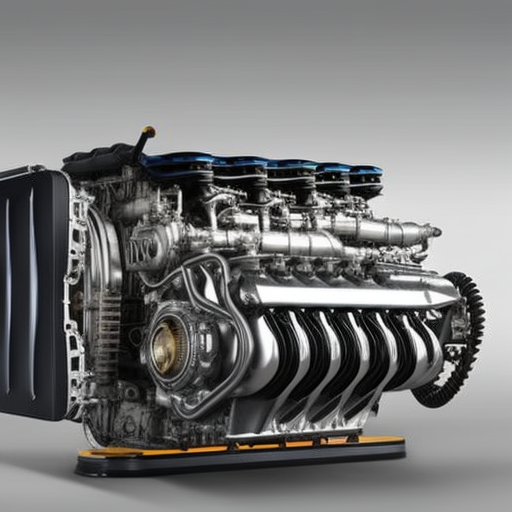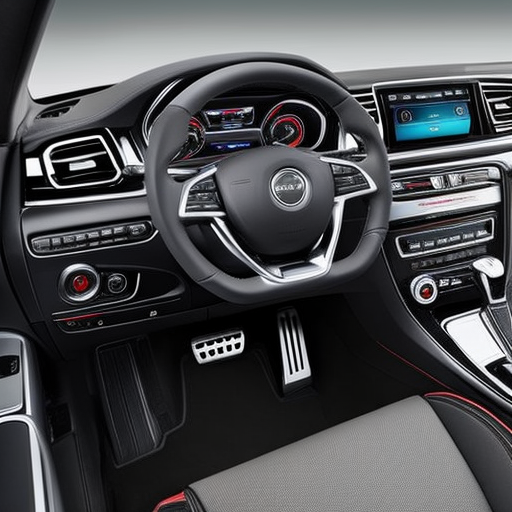Balancing Warranty and Modifications

‘An ounce of prevention is worth a pound of cure,’ and when it comes to vehicle modifications, understanding the delicate balance between customization and warranty coverage is crucial.
Navigating the impact of modifications on warranty coverage requires a strategic approach to ensure both personalization and warranty preservation.
In this article, we will explore the implications of vehicle modifications on warranty coverage and provide practical strategies for maintaining a harmonious balance between customization and warranty protection.
Understanding Warranty Coverage
While modifications to a vehicle can enhance its performance, it is important to understand how they may affect warranty coverage. Warranty misconceptions often lead vehicle owners to believe that any modifications will automatically void their warranty. However, this is not entirely true. The Magnuson-Moss Warranty Act protects consumers from such warranty misconceptions. According to this act, unless the modifications directly cause a failure, the warranty remains intact. It is crucial for vehicle owners to comprehend the distinction between modifications that may void the warranty and those that do not.
Modification misconceptions also play a significant role in this understanding. Many vehicle owners mistakenly assume that any alteration, no matter how minor, will void the warranty. However, minor modifications such as adding aftermarket wheels or exhaust systems generally do not affect the warranty. On the other hand, major modifications like engine tuning or suspension alterations could potentially impact the warranty coverage. Therefore, it is essential for vehicle owners to carefully consider the potential consequences before making any modifications and to seek clarification from the manufacturer or dealer regarding warranty coverage.
Understanding these misconceptions is crucial for maintaining a balance between vehicle modifications and warranty coverage.
Impact of Vehicle Modifications
When considering the impact of vehicle modifications, it’s important to understand the limitations that these changes may impose on warranty coverage.
Additionally, the trade-off between performance enhancements and potential warranty implications should be carefully evaluated.
Furthermore, it’s crucial to consider the legal and financial implications of vehicle modifications, as they can have lasting effects on ownership and maintenance costs.
Warranty Coverage Limitations
The impact of vehicle modifications on warranty coverage limitations is a critical consideration for automotive enthusiasts and consumers alike. When making modifications to a vehicle, it’s crucial to understand how these alterations can affect warranty coverage.
Several warranty coverage limitations need to be considered:
-
Voided Warranty: Certain modifications can lead to the complete voiding of the vehicle’s warranty.
-
Limited Coverage: Some modifications may result in the warranty only covering specific components or systems.
-
Manufacturer Approval: Warranty coverage limitations may depend on whether the modifications were approved by the vehicle’s manufacturer.
-
Third-Party Components: Warranty coverage might be impacted if non-original equipment manufacturer (OEM) components are used in the modifications.
Understanding these warranty coverage limitations is essential for individuals considering vehicle modifications to avoid potential issues with warranty claims.
Performance Vs. Warranty
The impact of vehicle modifications on warranty coverage limitations necessitates a careful evaluation of the trade-offs between enhanced performance and potential warranty implications. Performance upgrades such as engine tuning, suspension modifications, and aftermarket exhaust systems can significantly enhance a vehicle’s power, handling, and overall driving experience. However, these modifications can potentially void or limit the manufacturer’s warranty protection.
It is crucial for vehicle owners to understand the potential consequences of performance modifications on their warranty coverage. While some aftermarket parts may not affect the entire vehicle’s warranty, specific components related to the modifications may be excluded from warranty protection.
Hence, it is essential for vehicle owners to weigh the benefits of performance upgrades against the potential impact on warranty coverage before making modifications.
Legal and Financial Implications
Navigating the legal and financial implications of vehicle modifications requires careful consideration and understanding of the potential impact on warranty coverage. Making modifications to a vehicle can have significant legal implications and financial risks. It’s important to be aware of the following:
- Voided Warranty: Certain modifications can void the manufacturer’s warranty, leaving you responsible for any repairs or replacements.
- Insurance Coverage: Modifications may affect your insurance policy, potentially leading to increased premiums or denied claims.
- Resale Value: Some modifications can decrease the resale value of the vehicle.
- Legal Compliance: Certain modifications may not comply with local laws and regulations, leading to fines or legal consequences.
Understanding these implications is crucial for making informed decisions about vehicle modifications.
Moving forward, it is essential to consider the impact of manufacturer-approved modifications on warranty coverage.
Manufacturer Approved Modifications
As we explore the topic of manufacturer-approved modifications, it’s crucial to assess the impact on warranty coverage.
Understanding official modification guidelines and the installation of authorized parts are key components to consider.
These points will provide insight into how modifications can be made without jeopardizing the warranty.
Warranty Coverage Impact
When considering warranty coverage impact, it is essential to understand the implications of manufacturer-approved modifications on the terms of coverage. Manufacturer-approved modifications can have warranty implications and modification consequences that consumers should be aware of. Here are some key points to consider:
- Manufacturer-approved modifications may maintain warranty coverage for the modified parts.
- However, non-approved modifications may void the warranty for the affected components.
- It is crucial to carefully review the warranty terms regarding approved modifications.
- Consumers should seek clarification from the manufacturer regarding the impact of specific modifications on warranty coverage.
Understanding how manufacturer-approved modifications affect warranty coverage is vital for consumers seeking to modify their vehicles while maintaining warranty protection.
Now, let’s delve into the official modification guidelines.
Official Modification Guidelines
In accordance with the manufacturer’s guidelines, approved modifications must be conducted within the specified time frame to maintain warranty coverage. Official guidelines outline permissible changes that can be made to a vehicle without voiding the warranty. These guidelines often come with modification restrictions, such as the type of modifications allowed, the use of manufacturer-approved parts, and the requirement for the modifications to be carried out by certified technicians. Adhering to these guidelines is crucial for preserving warranty coverage while making modifications to the vehicle. Below is a table depicting some common manufacturer-approved modifications and their corresponding restrictions:
| Approved Modifications | Restrictions | Time Frame |
|---|---|---|
| Performance Tuning | Manufacturer-approved parts only | Within warranty period |
| Suspension Upgrades | Certified technician installation | Within warranty period |
| Body Kit Installation | Use of approved kits only | Within warranty period |
Transitioning to the subsequent section about ‘authorized parts installation’, it is important to understand how using manufacturer-approved parts is essential for warranty coverage.
Authorized Parts Installation
Continuing from the guidelines for approved modifications, the installation of manufacturer-approved parts is pivotal for maintaining warranty coverage. When installing authorized parts, it is crucial to adhere to specific installation guidelines to ensure warranty protection and optimal performance.
The following points should be considered:
- Adhere to manufacturer-approved installation procedures.
- Use only authorized parts specified for the particular make and model.
- Follow recommended torque specifications and assembly procedures.
- Retain records of the installation, including receipts and documentation of the authorized parts used.
Following these installation guidelines for authorized parts is essential to safeguard warranty coverage and ensure that modifications do not void the original warranty agreement.
Warranty Voiding Modifications
Modifications to the product that void the warranty should be approached with caution and careful consideration. Implementing aftermarket parts or making alterations to the product can have severe modification consequences, potentially resulting in the loss of warranty protection. It is crucial for consumers to understand that certain modifications, such as installing unauthorized parts or making significant alterations to the product, can render the manufacturer’s warranty void. In such instances, customers may be solely responsible for any repairs or replacements, leading to substantial financial implications.
To mitigate the risk of voiding the warranty, individuals should thoroughly review the terms and conditions outlined in the warranty agreement. Additionally, seeking approval from the manufacturer or authorized dealers before implementing any modifications is advisable. By doing so, consumers can ensure that their warranty protection remains intact, thereby safeguarding themselves from unforeseen expenses.
Transitioning into the subsequent section about warranty preservation strategies, it is essential for consumers to be aware of effective methods to maintain warranty coverage while making modifications to their products.
Warranty Preservation Strategies
To maintain warranty coverage while modifying a product, consumers should adhere to approved guidelines and seek authorization from the manufacturer or authorized dealers. This ensures that modifications are carried out in a manner that does not compromise the existing warranty.
To preserve warranty coverage, individuals can consider the following strategies:
-
Modification approval: Seek approval from the manufacturer or authorized dealers before making any modifications to the product. This ensures that the modifications are in line with the manufacturer’s specifications and do not void the warranty.
-
Authorized service centers: Utilize authorized service centers for any modifications or upgrades. These centers are familiar with the product and can ensure that the modifications are performed in a manner that does not compromise the warranty.
-
Use genuine parts: When making modifications, use genuine parts recommended by the manufacturer. This helps to maintain the integrity of the product and ensures that the warranty remains valid.
-
Document modifications: Keep detailed records of any modifications made, including receipts, invoices, and documentation from authorized dealers. This documentation can be crucial in preserving the warranty coverage in case of any future issues.
Seeking Professional Advice
Professional consultation with certified technicians is crucial for navigating the complexities of modifying products while safeguarding warranty coverage. Expert consultation ensures that any modifications made to a product comply with warranty guidelines and do not void the warranty. Certified technicians can provide valuable insights into the legal implications of specific modifications and can offer guidance on obtaining approval for modifications without compromising warranty coverage.
| Expert Consultation | Legal Implications |
|---|---|
| Certified technicians can provide expert advice on navigating warranty guidelines. | Modifying products without proper approval can lead to warranty voidance. |
| They can assess the impact of modifications on warranty coverage and provide recommendations. | Understanding the legal implications of modifications is crucial for preserving warranty coverage. |
| Certified technicians can guide product modifications to comply with warranty terms and conditions. | Modification approval is essential to avoid legal issues related to warranty coverage. |
| Their expertise can help in making informed decisions about modifications while safeguarding warranty coverage. | Seeking professional advice can mitigate the risks of warranty voidance due to unauthorized modifications. |
Frequently Asked Questions
Can I Modify My Vehicle and Still Maintain My Warranty Coverage?
When modifying vehicles, it’s important to consider the warranty implications. Installing aftermarket parts may void certain aspects of the warranty. Additionally, modified vehicles may present unique maintenance concerns that could affect warranty coverage.
What Are Some Common Modifications That Could Potentially Void My Warranty?
When considering potential modifications to a vehicle, it’s important to be mindful of their impact on the warranty. Common modifications such as engine tuning, suspension alterations, and aftermarket exhaust systems could potentially void the warranty coverage. Warranty considerations are crucial.
Are There Any Manufacturer-Approved Modifications That Won’t Impact My Warranty Coverage?
Looking to enhance your vehicle without compromising warranty coverage? Manufacturer-approved modifications, such as performance upgrades or accessories, could be the solution. Seek professional advice to ensure warranty-friendly aftermarket upgrades that won’t impact your coverage.
How Can I Ensure That My Warranty Remains Intact While Making Modifications to My Vehicle?
To ensure warranty preservation while making modifications to your vehicle, it’s essential to adhere to the manufacturer’s modification guidelines, consider certified alterations, and use aftermarket parts carefully. Expert consultation can help safeguard warranty protection.
When Should I Seek Professional Advice Regarding Modifications and Warranty Coverage?
Seeking guidance on warranty concerns and modification risks is crucial for vehicle owners. Expert opinion should be sought when in doubt, to ensure that modifications do not void the warranty and that the vehicle remains covered.
Conclusion
In conclusion, it is important to carefully consider the impact of vehicle modifications on warranty coverage. Manufacturers may void warranties for certain modifications, while others may be approved. Seeking professional advice and understanding warranty preservation strategies can help vehicle owners make informed decisions.
It is crucial to investigate the truth of the theory that warranties and modifications can coexist harmoniously to ensure the longevity and performance of the vehicle.





